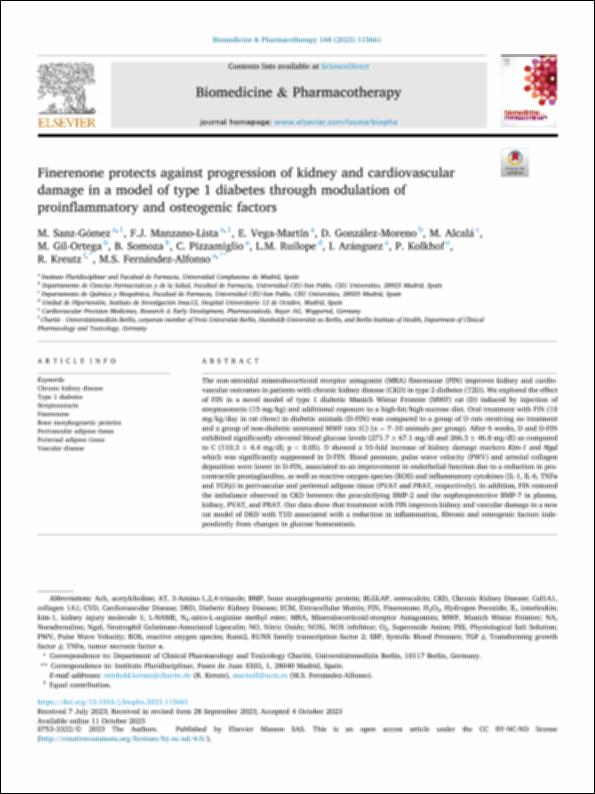Por favor, use este identificador para citar o enlazar este ítem:
http://hdl.handle.net/10637/14695Finerenone protects against progression of kidney and cardiovascular damage in a model of type 1 diabetes through modulation of proinflammatory and osteogenic factors
| Título : | Finerenone protects against progression of kidney and cardiovascular damage in a model of type 1 diabetes through modulation of proinflammatory and osteogenic factors |
| Autor : | Sanz-Gómez, Marta Manzano Lista, Francisco J. Vega Martín, Elena González Moreno, Daniel Alcalá Díaz-Mor, Martín Gil Ortega, Marta Pizzamiglio, C. Ruilope Urioste, Luis Miguel Aránguez, Isabel Kolkhof, Peter Kreutz, Reinhold Fernández Alfonso, María Soledad |
| Materias: | Chronic kidney disease; Type 1 diabetes; Streptozotocin; Finerenone; Bone morphogenetic proteins; Perivascular adipose tissue; Perirenal adipose tissue; Vascular disease |
| Editorial : | Elsevier |
| Citación : | Sanz-Gómez M, Manzano-Lista FJ, Vega-Martín E, Alcalá M Fernández-Alfonso MS. Finerenone protects against progression of kidney and cardiovascular damage in a model of type 1 diabetes through modulation of proinflammatory and osteogenic factors. Biomed Pharmacother. 2023 Oct 11;168:115661 |
| Resumen : | The non-steroidal mineralocorticoid receptor antagonist (MRA) finerenone (FIN) improves kidney and cardiovascular outcomes in patients with chronic kidney disease (CKD) in type 2 diabetes (T2D). We explored the effect of FIN in a novel model of type 1 diabetic Munich Wistar Fr¨omter (MWF) rat (D) induced by injection of streptozotocin (15 mg/kg) and additional exposure to a high-fat/high-sucrose diet. Oral treatment with FIN (10 mg/kg/day in rat chow) in diabetic animals (D-FIN) was compared to a group of D rats receiving no treatment and a group of non-diabetic untreated MWF rats (C) (n = 7–10 animals per group). After 6 weeks, D and D-FIN exhibited significantly elevated blood glucose levels (271.7 ± 67.1 mg/dl and 266.3 ± 46.8 mg/dl) as compared to C (110.3 ± 4.4 mg/dl; p < 0.05). D showed a 10-fold increase of kidney damage markers Kim-1 and Ngal which was significantly suppressed in D-FIN. Blood pressure, pulse wave velocity (PWV) and arterial collagen deposition were lower in D-FIN, associated to an improvement in endothelial function due to a reduction in procontractile prostaglandins, as well as reactive oxygen species (ROS) and inflammatory cytokines (IL-1, IL-6, TNFα and TGFβ) in perivascular and perirenal adipose tissue (PVAT and PRAT, respectively). In addition, FIN restored the imbalance observed in CKD between the procalcifying BMP-2 and the nephroprotective BMP-7 in plasma, kidney, PVAT, and PRAT. Our data show that treatment with FIN improves kidney and vascular damage in a new rat model of DKD with T1D associated with a reduction in inflammation, fibrosis and osteogenic factors independently from changes in glucose homeostasis. |
| URI : | http://hdl.handle.net/10637/14695 |
| Derechos: | http://creativecommons.org/licenses/by-nc-nd/4.0/deed.es OpenAccess |
| ISSN : | 0753-3322 |
| Fecha de publicación : | 11-oct-2023 |
| Centro : | Universidad San Pablo-CEU |
| Aparece en las colecciones: | Facultad de Farmacia |
Los ítems de DSpace están protegidos por copyright, con todos los derechos reservados, a menos que se indique lo contrario.


